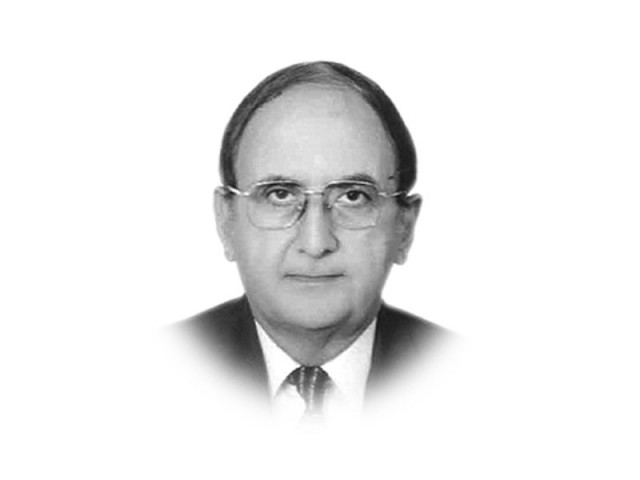Foreign policy dilemmas
Foreign policy must be based on mutually advantageous considerations rather than ideological, religious considerations

The writer is an independent political and defence analyst. He is also the author of several books, monographs and articles on Pakistan and South Asian Affairs
If a large number of states are viewed as Pakistan’s adversaries, it is difficult to relate with others in a positive manner. This creates the tendencies of isolationism and ultra-nationalism. The notions of sovereignty and national pride are overplayed to promote dislike of other states and the international system. They do not pay attention to international obligations but demand that the rest of the world think and act to their satisfaction. These orientations get reinforced by the traditionally combative relationship between India and Pakistan. The increased role of radical movements in Pakistan is also strengthening isolationist trends and combativeness towards several countries, especially the Western countries. Such a mindset conflicts with the current trends in international politics. Global and regional politics is no longer formulated on the basis of permanent ideological and political divides. In the 21st century, the world is more interdependent, characterised by globalisation, involving the movement of people, ideas and goods across the boundaries of the state. Engagement, active diplomacy, trade, investment and economic cooperative interaction are the hallmarks of the current international political order.
Two major factors shape the role of a state in regional and global contexts. First, internal political stability and cohesion, and economic resilience increase the capacity of a state to counter external pressures and increase its foreign policy options. Second, how relevant is a state for global economic interaction. This includes its trade relations, accessibility of its market to other countries and foreign investment.
Strong economic linkages defuse bilateral tensions and strengthen a state’s role at the global level. International trade and investment are possible if the state has political stability and a secure investment environment, as well as the availability of infrastructure facilities, especially energy and rationalised bureaucratic procedures. Foreign investors also monitor the quantum of local investment to judge the security and safety for foreign investments and investors.
Pakistan will be better placed if it coped with its internal problems and external threats by increasing its economic and trade relevance for the international community. This objective cannot be achieved without working earnestly for the creation of a stable and secure domestic environment by controlling internal violence and terrorism and putting its economic house in order by reviving its industrial and business sectors.
Pakistan’s negative image abroad cannot be countered unless the government controls religious and cultural extremism, and eliminates terrorism. The rhetoric of Pakistan being the victim of terrorism gives only one side of the truth. The other side is that Pakistan is also a source of transnational terrorism. Furthermore, the terrorist groups in Pakistan are indigenous and will not give up violence until the Pakistan government adopts a tough policy to eliminate them. The elimination of violence and terrorism of all kinds should be the highest priority of Pakistan’s civilian and military authorities.
We are living in an era of regional economic cooperation and trade. Pakistan should expand its trade and economic relations with India, Iran, Afghanistan and Central Asia. It must also look for new markets in Africa and South America. Pakistan can learn from China’s India policy. Despite territorial disputes and political differences, China has developed strong economic and trade relations with India. It has also developed trade and human interactions with Taiwan, although it views the latter as a breakaway province that needs to be brought back into China.
Foreign policy must be based on mutually advantageous considerations rather than on some puritanical ideological or religious considerations. It must identify commonalities and reduce differences with other countries. The positive experience of mutual interaction, over the years, expands areas of commonalities and reduces disagreements. One problem in Pakistan is that any foreign country, developing active relations with India, is looked at with suspicion and doubt. Pakistan’s foreign policy must reduce its India obsession.
There are no purely religious wars or purely religion-based friendships today. Pakistan may emphasise common religion and culture with Muslim states; however, this cannot be a basis of enduring relationships unless other more practical considerations are developed in terms of political, security, economic and trade interests. Bilateral relations can be strengthened by a transfer of technology, exchange of qualified human power and promotion of non-official societal linkages.
The Muslim world is diversified in terms of historical backgrounds, political orientations and agendas, and power interests. Therefore, it is difficult to cultivate an operational consensus on regional and international issues among the Muslim states. However, cooperation can be built on pragmatic political and economic considerations. Pakistan must avoid involvement in intra-Middle East political conflicts, dynastic jealousies and power politics. It should not take a partisan position on internal strife and power struggles in Arab states, like Syria, Bahrain and Egypt.
Pakistan needs to cultivate friendly interactions with as many countries as possible if it wants to cope with internal and external challenges. It must also pursue active diplomacy in international and regional organisations. Such activism provides opportunity to remove misperceptions about Pakistan. It should ensure peace on its borders and within its territory as well, if it wants to come out of its present economic, political and strategic predicament. It must recognise the realities of the current international order rather than live in a self-created world of illusions and denials.
Published in The Express Tribune, March 10th, 2014.
Like Opinion & Editorial on Facebook, follow @ETOpEd on Twitter to receive all updates on all our daily pieces.















COMMENTS
Comments are moderated and generally will be posted if they are on-topic and not abusive.
For more information, please see our Comments FAQ